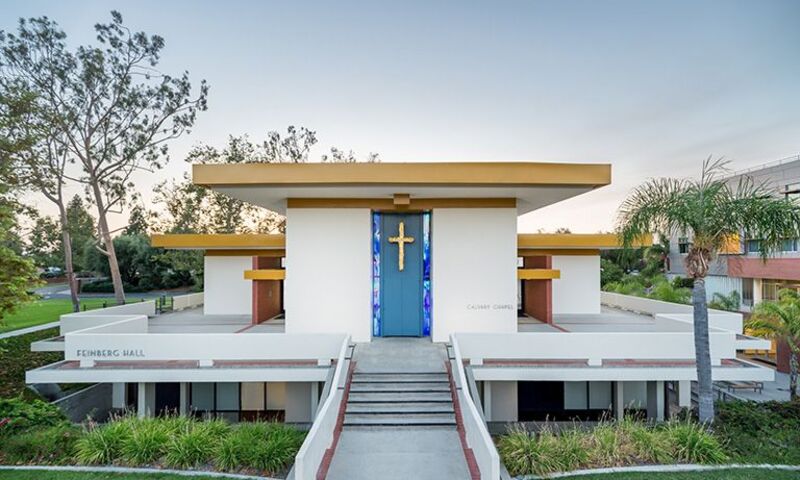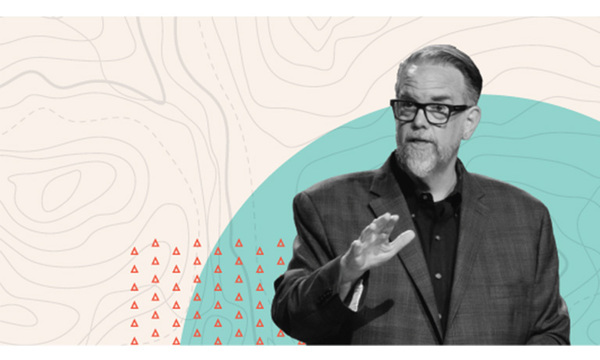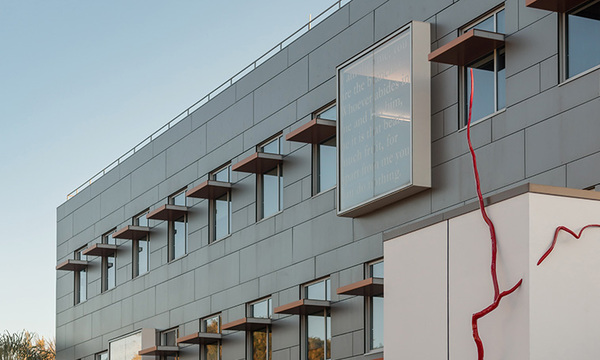In 1986, Talbot School of Theology arranged the necessary preparations for the inauguration of its Spanish-language program.
Brochures were printed with relevant information for prospective students. Visionary course descriptions were crafted for the course catalog. Spanish-speaking faculty members were mobilized. For all intents and purposes, this program was “signed, sealed, and delivered.” Except for the fact that it was never “delivered.”
The vicissitudes of academic misfortune reared their ugly heads and Talbot’s plans to begin academic programs in Spanish were derailed.
The comma between the final two words of the idiom “Signed, Sealed, and Delivered” — the phrase that Stevie Wonder popularized by his 1970 Motown classic hit has lasted nearly four decades. During this period, there was a conspicuous silence concerning a vision that Talbot anticipated would eventually emerge, akin to an intertestamental period of sorts in which the progression toward the fulfillment of a great hope had seemingly stalled.
Be that as it may, the dream of Spanish-language programs at Talbot persisted among a far-seeing remnant at the institution. Throughout the years, Talbot’s Spanish-language program did not materialize for untold, now even forgotten, reasons. Just as the faithful patiently awaited the fulfillment of their hope during the period between the Old and New Testaments, so Talbot’s visionaries continued to anticipate a moment in which offering Spanish-language programs would be a reality.
Now, that moment has come, with the launch of Talbot en Español, a new initiative offering theological training fully online and completely in Spanish. Beginning this fall, Talbot School of Theology will welcome its first students into the Certificado en Estudios Bíblicos y Teológicos — the Certificate in Biblical and Theological Studies — the first of several planned graduate-level academic programs that will serve Spanish speakers who desire to deepen their love for God and his Word.
Providential Preparation
During the period of “silence,” Talbot’s administration providentially positioned the institution for the historical moment in which their hope would be fulfilled. They shrewdly recognized the significant contributions that would be made by recruiting Spanish-speaking scholars and staff members of the highest caliber and appointed several employees who serve at Talbot to the present day: Dr. Orbelina Eguizabal, Dr. Octavio Esqueda, Dr. Matt Williams, and Dr. Oscar Merlo. These members of Talbot’s Spanish-speaking contingency are deeply invested in a variety of Spanish-language ministries and have functioned to organically bridge gaps between the institution and the Spanish-speaking community during their tenures at Talbot.
The success of Dr. Orbelina Eguizabal serves as a prime example of how relevant Talbot has become in the Spanish-speaking community in Southern California and around the world. Eguizabal facilitated the training of leaders and the development of educational ministries in the Latin American context for over 20 years in her home country of Guatemala. She finished her tenure there ultimately serving as dean of the Central American Theological Seminary. In 2007, Eguizabal transitioned into her role at Talbot, where she has helped launch a support program for Latina female students at Biola and has served for over a decade on the Biola Hispanic Conference planning committee. Eguizabal continues a vigorous academic agenda as well: She presents seminars at international theological education conferences, writes on the topic of Spiritual Formation of Latinos in Latino Protestant Churches in the U.S., and continues to be involved in supporting theological education efforts in Latin America and other countries around the world.
Or take, for example, the accomplishments of Dr. Octavio Esqueda as an example of how Talbot has uniquely positioned itself to serve the global Spanish-speaking community by employing noteworthy Spanish-speaking scholars and churchmen. Esqueda is a professor of Christian higher education and the director of the Ph.D. and Ed.D. programs in Educational Studies at Talbot. A native of Mexico, Esqueda is the most read blogger on Talbot’s Good Book Blog, where he publishes on practical aspects of ministry, contemporary theological issues, and other topics directly relating to the Spanish-speaking community in the United States and abroad. Over the past five years, eight out of the top 25 most-read posts across the Good Book Blog are Spanish-language posts authored by Esqueda. He has been serving the Hispanic church in a similar manner through his column on the Baptist Press website, the official news outlet for the Southern Baptist Convention. Esqueda is presently an elder at a local congregation, the Church at Green Hills, and there exercises his keen ability to contextualize biblical and theological messages in a manner that is acutely appropriate for the Spanish-speaking community.
We have still to mention the accomplishments of Dr. Matthew Williams. After finishing his Ph.D. in North America, Williams moved to Barcelona, Spain, where he taught in Spanish for seven years. Williams transitioned to Biola University in 2002 and brought with him a broad teaching experience in Spanish. This foreshadowed Williams' fruitful ministry among Spanish speakers in the North American context and abroad while serving at Talbot. For many years, Williams was the general editor for the Colección Teológica Contemporánea, a series of theological books in Spanish. Additionally, Williams has authored articles in English and in Spanish in The Journal of Higher Criticism, Agenda Teológica and Trinity Journal and has contributed to La Epístola a los Gálatas, The Synoptic Problem, The Synoptic Gospels, and Historians of the Christian Tradition.
In 2017, Dr. Oscar Merlo came to Biola as the director of the Center for the Study of the Work and Ministry of the Holy Spirit Today at Talbot. A native of Honduras, Merlo has over 30 years of experience serving as an American Baptist minister. He also actively serves in five Southern California pastors’ networks, representing over 600 churches. Prior to coming to Talbot, Merlo engaged in pastoral training, evangelism, and discipleship in 17 countries in Latin America and the Caribbean. Partnering with Biola LEARN, Merlo developed the Diplomado en Ministerio y Liderazgo — or Diploma in Ministry and Leadership — to revitalize Spanish-speaking ministry leaders and equip them to multiply leaders in their local contexts.
Currently, Merlo is a member of the board of trustees of the Association for Hispanic Theological Education (AETH), Mateo 25 (a Christian organization that works with families that are facing deportation), and the American Baptist Theological Center. Additionally, Merlo is currently the director of the Biola Hispanic Conference committee. This conference brings hundreds of Spanish-speaking pastors and church people from all over the globe to Biola’s campus on an annual basis.
The hiring of these key faculty and staff members was the clamoring in the wilderness during the intertestamental period of “silence” — between the initial planning of Talbot’s Spanish-language program and its implementation. Yet, even in the putative era of “silence,” developments were providentially transpiring that uniquely positioned Talbot to provide wide-ranging, Spanish-language academic programs that would have a global impact. One of the greatest of these developments is the creation and rapid expansion of the internet. The potential impact of Talbot’s Spanish-speaking professors and staff synergistically multiplied since the initial plans of 1986 as a result of access to the world via the internet. At this point in history, Talbot can participate in the biblical and theological education of Spanish speakers in Southern California and throughout the globe from our campus in La Mirada, California.
Now it is time to “deliver!”
Delivering on the Dream
Louder rumblings of the advent of a Spanish-language program began a couple of years ago. In a friendly conversation over lunch, the former dean of Talbot, Dr. Clinton E. Arnold, communicated with me his hope of implementing a Spanish-language program. Arnold’s vision was clear: He stressed that Talbot needed to effectively serve its neighboring communities in the Greater Los Angeles area by providing excellent, Spanish-language biblical and theological programs while genuinely learning from these well-established communities. Arnold was not content with setting the pieces in place in order to potentially bring a program to life one day. He was prepared for Talbot to transcend the period of silence and for a Spanish-language program to emerge in its fullness.
Dr. Arnold continued to imagine, develop, and share his vision with others. As he did so, others began dreaming along with him and strived to breathe life into the program. Arnold’s vision was deeply impactful upon me to the point where I transitioned to Talbot as a professor of Old Testament and Semitics with plans to serve as the director of the fledgling Spanish-language academic initiative in the fall of 2021. Other friends of Talbot also aspired to expand the work of the institution to include Spanish-speaking students and committed to financially partner with Talbot in support of this initiative. The generosity of these financial partners provided the resources for the initial contracting of the departmental support network and the development of courses. Thanks in large part to the financial partners, “Talbot en Español” — the official department that will offer Spanish-language courses at the institution — was formed in the fall of 2022.
During his tenure as dean, Arnold would frequently make inspirational comments like, “We will get a Spanish-language program off the ground, if it is the last thing I do as dean!” Arnold’s comments were prophetic. The creation of Talbot en Español was indeed one of the last of Arnold’s many accomplishments as dean prior to his transition back to being a full-time faculty member. Dr. Tim Pickavance picked up where Arnold left off, guiding Talbot en Español through Biola’s internal processes for new academic programs. At the beginning of 2023, Talbot en Español completed these processes for the initial phase of Spanish-language course offerings and thus, Talbot en Español is now developing its first online Spanish-language, graduate-level biblical and theological courses. Starting in the fall semester of 2023, Talbot School of Theology is poised to begin offering courses toward a Certificate in Biblical and Theological Studies. We are now accepting applications! The aspiration is that the Master of Arts and Master of Divinity programs will be accepting Spanish-speaking students by the fall of 2024.
This part is once again, “signed and sealed.”
The brochures and course listings from the 1986 endeavor are still on my desk. I keep them there to intentionally serve as a motivating reminder that good ideas and objectives can be thwarted for a multitude of quickly forgotten reasons. They serve as a reminder that preparation is not equivalent to implementation. They serve as a reminder that something that is obvious is not always something that is acted upon. They serve as a reminder that planning something well does not mean doing something well — or even doing that thing at all.
Signing and sealing means nothing without delivering.
After a near four-decade pause in official plans to begin a Spanish-language program — a period of time that many may have perceived as radio silence — Talbot School of Theology is now ready to “deliver!” It is time to proceed with this overdue crucial initiative whose implementation has been envisioned since 1986.
Please pray along with us that Talbot School of Theology will deliver trustworthy biblical and theological education in a manner uniquely contextualized for Spanish-speaking students while simultaneously learning from this community how to come alongside it in the meaningful gospel work that is already being carried out in the Spanish-speaking context.
Talbot en Español
Talbot’s first Spanish-language program, el Certificado en Estudios Bíblicos y Teológicos — taught fully in Spanish and fully online — launches in Fall 2023. Learn more and apply at biola.edu/talbot-en-espanol.
 Biola University
Biola University




.jpg)